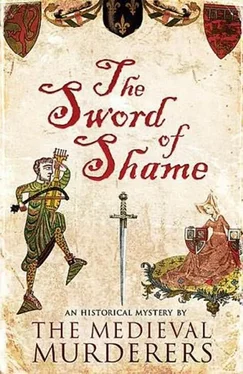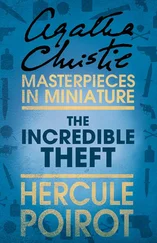‘Yes, do explore the matter, Brother,’ said Rose maliciously. ‘Sir Philip had a wife who is now free to take a younger, more comely husband; friends who argued with him-excepting dear Sir Elias, of course; servants who despised him for sitting indoors when he was needed in the fields; and a prioress who was afraid he might withhold donations of eggs. You have a wealth of suspects to choose from.’
‘I feel sorry for Lymbury,’ said Bartholomew in a low voice to Michael, when everyone started to shout again. ‘No one seems very upset by his death, with the possible exception of Dole.’
‘Was his killer a man?’ asked Michael. ‘It must have taken a lot of power to drive a blade through the back of a chair and then into a body.’
Bartholomew did not think so. ‘It was pushed through a gap in the panelling. The killer struck hard, but it was not a demonic kind of strength. Anyone could have done it-including Lady Joan and Sister Rose, who are fit, healthy women.’
‘But it was not my son,’ shouted Hog, his furious voice silencing the others by sheer dint of its volume. ‘Not James. Whoever killed Sir Philip will be covered in blood, and you can see for yourselves that there is not a spot on James. You also know he is not a cunning boy-it would never have occurred to him to rid himself of incriminating stains if he had committed this crime. You know this, because you know James.’
James hung his head. ‘A while after you had all gone hunting, Sir Philip sent me to fetch William the Vicar, because he said he was finally ready to dictate his new will. He was alive when I left, and I did not see anyone else nearby. Every villager is out in the fields, as my father said.’
‘I do not think this case will greatly tax your scholarly wits, Brother,’ said Lady Joan spitefully. ‘This morning, I went to escort Sir Elias to his destrier, and I left Rose alone with Philip.’
‘Not alone,’ corrected Rose. ‘Dame Pauline was with us-and it was only a matter of moments anyway, because I did not want to be left behind. Sir Philip asked after my health and I told him I was well. That was the full extent of our conversation.’
‘I can vouch for that,’ said the old nun bitterly. ‘I was hoping she might linger, to reduce the time I was obliged to spend astride that horrible mule-you all know how it pains my hips to ride the thing-but she rushed out far too quickly.’
‘And it is irrelevant anyway,’ added Rose loftily. ‘James saw Sir Philip alive after all this had happened and we had gone.’
‘That is true,’ acknowledged James. He looked frightened. ‘But that does not mean I killed him.’ He appealed to Michael. ‘Please, Brother! You have to believe me!’
‘Well, my husband was hale and hearty this morning-’ began Joan angrily.
‘He was not,’ contradicted Rose. ‘He said he was unwell.’
‘He often claimed he was ailing,’ said William. ‘But it meant nothing-he said he was feverish before Poitiers, but that did not stop him from killing a dozen Frenchmen.’
‘He had my trouble,’ agreed Pauline. ‘Aching joints. What happened to this claret I was promised? And none of that slop you feed the servants, either. I want the good stuff.’
Hog tapped his son on the shoulder, and James escaped to fetch the wine with some relief. Bartholomew wondered whether he would come back: the manor’s residents were eager for a culprit, and it would not be the first time innocent blood was spilled in the rush to secure an explanation.
‘Shall we remove the sword?’ asked Hog in the silence that followed his boy’s departure. ‘It is not right to leave the thing where it is.’
‘That damned blade,’ said Dole unhappily. ‘It brought him nothing but trouble. Yes, pull it out, Hog. It distresses me to see it there.’
Bartholomew watched Hog extricate the weapon from Lymbury, then helped him lay the body on the floor. Dole muttered a few prayers before asking William to see about its removal to the church. William, however, was more interested in the sword than in the mortal remains of its owner.
‘It is magnificent,’ he said, taking one or two practise sweeps. ‘Look at the elegant dog-head carvings on the cross and this perfectly balanced blade. It belonged to a fellow called Matthew de Curterne from Down St Mary. Remember how Lymbury found it with his corpse after Poitiers? We drew lots for it, and Lymbury won.’
‘You did not return it to Curterne’s family?’ asked Bartholomew, surprised. It was the usual custom in such a situation.
William shook his head. ‘Lymbury sent them a silver chalice instead. A fine weapon like this belongs in the hands of a warrior, and Curterne told us all his kin were farmers.’
‘It is old and heavy,’ said Dole disagreeably, watching William prance. ‘And I did not like the tales Curterne told us about its origins-how it brought bad luck and shame to its owners. I particularly did not like the story about the coroner’s man in Exeter, who was hanged for a crime he did not commit.’
‘He was not hanged,’ said William, his priestly robes swinging as he feinted and parried with an imaginary foe. ‘Curterne said the fellow’s master secured his freedom through some clever thinking. You know how sharp these coroners can be.’
‘And there was that business in Venice,’ Dole went on, unconvinced. ‘It was hurled into the sea, but contrived to have itself hauled out again. Very sinister. Curterne also told me it has the ability to fly through the air and embed itself in people it does not like.’
‘Does it, indeed?’ murmured Michael. ‘That would be a convenient solution for someone here.’
‘It cut his hand when he was a child,’ insisted Dole. ‘He bore the scar to prove it-he said it came out of nowhere and almost severed his thumb. And he mentioned a servant who tried to steal it from him, who ended up breaking his neck when he tried to escape over the roof.’
‘So why did Curterne take it to Poitiers, then?’ asked Bartholomew doubtfully. ‘It sounds as though he thought it might be cursed in some way.’
‘He had no choice,’ explained William. ‘He had spent all his available money on horse and armour, and had no means to buy a different weapon. But perhaps he exaggerated his concerns, thought it was less likely to be stolen if folk believed it might bring them bad luck.’
‘No, he should have left it in Devonshire,’ argued Dole. ‘He said the first time we met him that there was something odd about it.’
‘Those were stories he invented around the campfire to entertain us,’ said William dismissively. ‘I am surprised at you, Dole, unsettled by silly tales with no truth or basis.’
‘Then why did Lymbury’s luck change the moment he acquired the thing,’ demanded Dole, unconvinced. ‘A wife unable to give him an heir-’
‘It has only been a year,’ objected William, laughing. ‘Give the poor woman a chance!’
‘-sheep killed by mad dogs, fires in his granaries,’ Dole went on, cutting across Joan’s indignant response. ‘And Curterne told me it was called the Sword of Shame, and only a fool would willingly take charge of a weapon with that sort of name.’
‘So, why did you draw lots for it after Curterne’s death, then?’ asked Bartholomew curiously. ‘It does not sound as though it is the kind of weapon most men would want to own.’
‘Superstition is for the feeble minded,’ said William, smiling fondly at the blade. ‘I am not afraid of ghosts, and neither was Lymbury. I imagine Dole-and perhaps Askyl-would have sold it, had they won the draw. But I would have kept it. These ridiculous tales are a nonsense, and besides, the inscriptions carved into its blade suggest it is a thing of honour.’
Читать дальше












